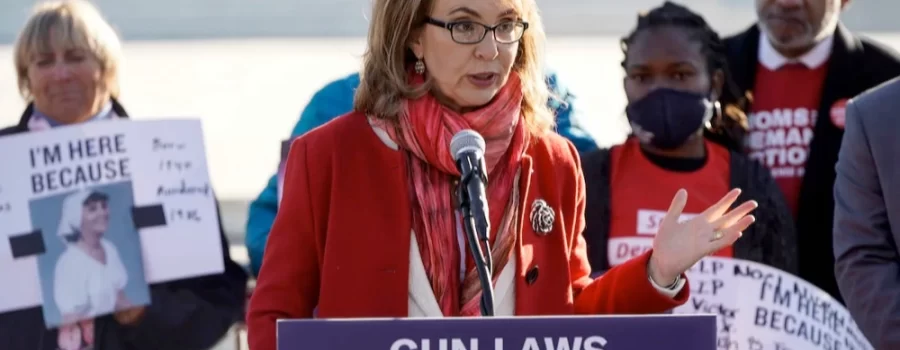I had the good fortune to see the premiere viewing of the new documentary film, Gabby Giffords Won’t Back Down, directed by Julie Cohen and Betsy West. As you may remember, Congresswoman Gabrielle Giffords was shot in the head in January 2011, while speaking at the parking lot of a Safeway store in Tucson, AZ where six other people were killed, including a 9-year-old girl, and several others injured.
Through actual footage of her hospitalization and therapy, the film depicts Gabby’s incredible recovery and heroic struggle to speak again as the bullet destroyed the language part of her brain. Supported by her husband, Mark Kelly, former NASA astronaut and now Arizona U.S. senator, Gabby’s personality radiates from the screen. Her joyful personality, lively sense of humor, and incredible ability to connect with others is inspirational.
No longer a member of Congress, Gabby has used her personal experience with gun violence, to establish an organization called Giffords Gun Owners for Safety to advocate for commonsense gun safety laws. While respecting the Second Amendment, the organization’s goal is to reduce gun violence and protect the safety of our communities through universal background checks and responsible gun ownership laws. The film begins with Gabby Giffords in front of the U.S. Capitol placing flowers throughout a huge field, symbolizing each person killed by gun violence in the past year. As the film ends, we’re reminded that the recent bipartisan gun legislation, the first passed in decades, is only a small step forward. More policy change is needed to stem the tsunami of gun violence that has swept across this nation.
While Gabby’s survival and recovery from this tragic incident is truly remarkable, I came away with some reflections that might be relevant to others who have experienced a traumatic health crisis in their lives.
- Access to Healthcare Services—As a member of Congress, Gabby had excellent health insurance coverage and access to the best medical care possible. Initially taken to the University Medical Center of Tucson for emergency surgery, she was soon transferred to the Texas Medical Center’s Neuroscience ICU in Houston to receive care from a coordinated team of healthcare practitioners. She was then transferred to TIRR Memorial Hermann to begin extensive inpatient rehabilitation therapy. As a member of Congress, Gabby advocated for universal healthcare; yet still millions of Americans are without insurance coverage. Despite the passage of the Affordable Care Act (ACA) in 2010, health insurance is still too costly for many, and travel to top-notch hospitals in the U.S. is not often feasible. When faced with a sudden medical situation, we’re often unsure what to do. Identifying and getting to the best facility can be difficult and out of reach. However, in an emergency, obtaining immediate care is vital to survival, whether you have insurance or not. In Gabby’s case, speech therapy to address her aphasia, or language impairment, was critical to her recovery. After such a serious injury, she was fortunate to receive outstanding rehabilitation therapy that may be inaccessible for others.
- Support of Family—Gabby was fortunate to have a devoted husband who supported her throughout the entire ordeal. Her parents stayed with her in Houston every day, even while her astronaut husband was traveling through space. In fact, Mark Kelly was able to get news of his wife’s reconstructive surgery on her skull while he and his crew were docking with the International Space Station. The value of family during a health crisis is immeasurable, and I believe a family’s love and emotional support are essential to one’s successful recovery.
- Developing a Positive, Resilient Sprit—Throughout Gabby’s recovery, she maintained a willingness to persevere. Music and singing played a big role in her speech therapy. While singing had always brought her much joy, the music helped to stimulate the neuroplasticity of the brain and enabled her to speak again. She continued to sing songs and enjoy music from the 80’s throughout her recuperation. Yes, there were times when she became frustrated and sobbed when she couldn’t say the words, but, with the help of a compassionate and skilled therapist, her resilient spirit prevailed.
- Finding Meaning and Purpose— After a traumatic experience, it is difficult to make sense of it all, become depressed, and lament a ruined life. Gabby didn’t do that. Realizing that she could not adequately represent her constituents in Arizona any longer, Gabby Giffords found another way to serve her country and give meaning to her life. She used her tragedy and devoted her energies to a higher calling. Her advocacy for reducing gun violence and for commonsense gun safety laws became a way of creating something positive out of the catastrophic experience. It is often difficult to find the will and motivation to persevere when we’re faced with an overwhelming, life-threatening health crisis. However, if we can find a way to help others, we often find that we help ourselves too.
Gabby Giffords Won’t Back Down is a heroic comeback story. As a victim of gun violence who couldn’t walk or talk, she can now ride a recumbent bike and give speeches as an activist for gun safety legislation. She is truly worthy of the recently bestowed Presidential Medal of Freedom. Bravo to the directors for bringing her story to us all.





Leave a Reply
Your email is safe with us.